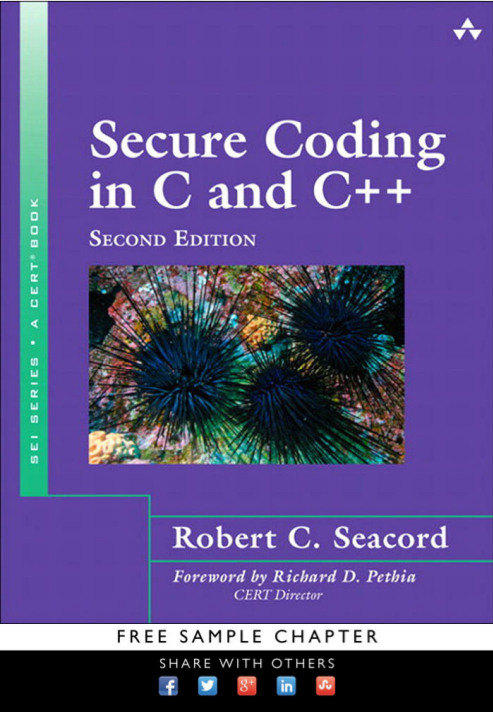Common Security Flaws
Common Security Flaws
| Seminare | 2 SWS / 5,0 ECTS |
| Veranstalter: | Paul Muntean |
| Zeit und Ort: | 08:00 - 09:30 Uhr; 01.08.033 |
| Beginn: | 2017-10-16 |
Aktuelles
- Es sind noch einige Proseminar Plätze frei! Bitte über Email an mich: paul@sec.in.tum.de bewerben.
Termine
Vorbesprechung: 04.07.2017 - 11:00 Uhr in Raum 01.08.033
Inhalt
Dieses Proseminar beschäftigt sich mit den gängingen Sicherheitlücken, die in C/C++ und JavaScript/PHP Anwendungen weit verbreitet auftreten. Die Ausnutzbarkeit der Sicherheitlücken und mögliche Gegenmaßnahmen werden behandelt. Inhalte sind verschiedene Software- und Webanwendung-Schwachstellen.
Voraussetzungen für die Teilnahme
- Grundlegende Programmierkenntnisse
- Verfassen eines Motivationschreibens
- TUM-Notentranskript (oder eine Liste) mit allen belegten Vorlesungen, Seminaren, etc.
- Abgabe bis 11 Juli per Verschlüsselte E-Mail an den Betreuer, E-Mail: paul@sec.in.tum.de
- Eine DIN A4 Seite
- Warum möchten Sie teilnehmen?
- Welches Thema möchten Sie warum bearbeiten?
Anmeldung / Abmeldung in TUM Online
- Die Anmeldung in TUM Online wird vom Seminarbetreuer durchgeführt.
Was wird erwartet
- Grundlegende Programmierkenntnisse in C/C++ und/oder JavaScript.
- Jedes Thema wird einzeln bearbeitet.
- Literaturrecherche.
- Erstellung einer Ausarbeitung in LaTeX (LNCS Format Template).
- Allgemeine Hilfestellungen zum wissenschaftlichen Schreiben und LaTeX finden Sie auf unserer Webseite Hilfestellungen zu Seminaren.
- Jeder Bericht sollte zwischen 10 und 15 Seiten sein (Deckblatt und Inhaltsverzeichnis nicht inbegriffen).
- Präsentation des Themas (PowerPoint etc.)
- Die Präsentation sollte 30 Min. und die Diskussion danach sollte 15 Min. dauern.
- Aktive Mitarbeit und Diskussion is erwünscht.
Termine und Themen
| Title | Speaker | Date |
| Kick-off Meeting | Paul M. | 04.07.2017 |
| Prepare the literature research and report outline | all students | 16.10.2017 |
| Introduction of the runtime attacks and defenses | Paul M. | 23.10.2017 |
| Deliver via Email the literature research and report outline | all students | 30.10.2017 |
|
Topic 1, Book 1. Buffer Overruns e.g., reference paper Topic 2, Book 1. Format Strings Flaws e.g., reference paper |
tba Jonathan Kaleve |
06.11.2017 |
|
Topic 3, Book 1. Integer Security Flaws e.g., reference paper Topic 4, Book 1. Pointer Subterfuge Flaws e.g., reference paper |
Daniel Felber Alex Todoran |
13.11.2017 |
|
Topic 5, Book 1. Uncaught Exception Flaws e.g., reference paper Topic 6, Book 1. File I/O Flaws e.g., reference paper |
tba. tba |
20.11.2017 |
|
Topic 7, Book 1. Formatted Output Flaws e.g., reference paper Topic 8, Book 1. Concurrency Flaws e.g., reference paper |
Leonhard Kurthen Jonas Donhauser |
27.11.2017 |
|
Topic 9, Book 1. Dynamic Memory Management e.g., reference paper in ch. 4 Topic 10, Book 1. Good Practices against Flaws e.g., reference paper |
Benedikt Mörtl tba |
04.12.2017 |
|
Topic 11, Book 2. Website Injection Flaws e.g., reference paper Topic 12, Book 2. Cross-Site Scripting (XSS) e.g., reference paper |
Richard Viehöver Alexander Ambos |
11.12.2017 |
|
Topic 13, Book 2. Cross-Site Request Forgery (CSRF) e.g., reference paper Topic 14, Book 2. Clickjacking Flaws e.g., reference paper |
Maximilian Jelinek Oğuz Gültepe |
18.12.2017 |
| End of presentation phase and delivery of the first version report to me (one pdf file/email) | all students | 08.01.2018 |
| Distribution of the review topics; one email; 2 reports/student | all students | 15.01.2018 |
|
Delivery of the reviews to me over email, two pdf files 1. Add comments directly to the pdf file. 2. More than 20 comments per report review are indicated. |
all students | 22.01.2018 |
| Return of the reviews to the students (email format, one pdf file) | all students | 29.01.2018 |
| Final report delivery with email format in one pdf file | all students | 05.02.2018 |
Ergänzende Literatur
Die folgenden Bücher sind relevant für alle Themen dieses Proseminar und daher eine Empfehlung für alle Seminarteilnehmer:
 |
C/C++ Sicherheitsthemen: Book 1: Secure Coding in C and C++ |
 |
Web Sicherheitsthemen: Book 2: Web Security A WhiteHat Perspective |
Empfehlenswerte Links
- isocpp.org (C++ Programmierstandard)
- C++ Programmierstandard (Programmierstandard Bericht)
- C++ Core Guideline GitHub Repo. (C++ Porgrammierrichtlinien Git Repo.)
- securecoding.cert.org (CERT C/C++ Programmierstandard)
- IT-Grundschutz (Webanwendungen)
- DBLP (Literaturrecherche)
- Google Scholar (Literaturrecherche)
- NVD (Allgemeine Schwachstellen-Datenbank)
- OWASP (Web Schwachstellen-Datenbank)
Weitere Leseempfehlungen
 |
24 Deadly Sins of Software Security Michael Howard, David LeBlanc and John Viega McGraw-Hill Education ISBN-13: 978-0071626750 |
 |
Modern Operating Systems Andrew S. Tanenbaum Prentice Hall International ISBN: 978-0130926418 |
 |
SEI Cert C Security Standards Software Eng. Institute SEI CMU ISBN: - |
 |
Writing Secure Code: Practical Strategies and Proven Techniques for Building Secure Applications in a Networked World Michael Howard, David LeBlanc |
 |
Geekonomics: The Real Cost of Insecure Software David Rice Addison-Wesley Professional ISBN-13: 978-0321735973 |
 |
Hacking: The Art of Exploitation Jon Erickson No Starch Press ISBN-13: 978-1593271442 |
